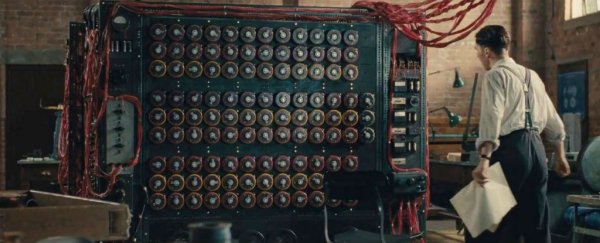Researchers have restored the earliest known recording of computer-generated music, and it was recorded more than 65 years ago using a machine built by Alan Turing.
The recording includes three different melodies - "God Save the King", "Baa Baa Black Sheep", and Glenn Miller hit "In The Mood" - all played on a gigantic computer in Turing's Computing Machine Laboratory in Manchester, England in 1951.
The computer-generated music was originally recorded for a BBC broadcast by British schoolteacher and pianist Christopher Strachey, who managed to program the national anthem, "God Save the King", into Turing's machine.
You can hear him hanging out with a BBC presenter in Turing's lab, pulling an historic all-nighter while he debugged his program to play some tunes:
It's a pretty special thing that we're listening to here, and the only reason we're hearing it is because a couple of researchers from New Zealand managed to dig it up and figure out what it would have sounded like without more than six decades of degradation.
"Today all that remains of the recording session is a 12-inch single-sided acetate disc, cut by the BBC's technician while the computer played," says Jack Copeland from the University of Canterbury, who is director of the online Turing Archive for the History of Computing.
"The computer itself was scrapped long ago, so the archived recording is our only window on that historic soundscape."
Together with University of Canterbury composer Jason Long, Copeland dug up the recording, and realised that it sounded nothing like it would have in 1951.
"What a disappointment it was … to discover that the frequencies in the recording were not accurate: the recording gave at best only a rough impression of how the computer sounded," says Copeland.
"There was a deviation in the speed of the recording, probably as a result of the turntable in BBC's portable disc cutter rotating too fast."
By figuring out the actual speed of the audio, balancing out the 'wobble', filtering out the noise, and using pitch-correction software, Copeland and Long have produced what they say is the most accurate restoration of the recording ever.
"It was a beautiful moment when we first heard the true sound of Turing's computer," the pair writes in a blog post.
If you listen to it above, you not only hear the three tunes played on the computer, but also a number of glitches and quips from Strachey and the presenter.
In a major dad moment, the presenter notes, "The machine's obviously not in the mood," when the computer halts up during "In The Mood".
So what did Turing think of hearing the first ever computer-generated music played on one of his machines? As the AFP reports, Strachey recalled Turing telling him, "Good show."
We love it.
And just in case you were wondering, here's what music generated by a computer today sounds like - no composer required:
